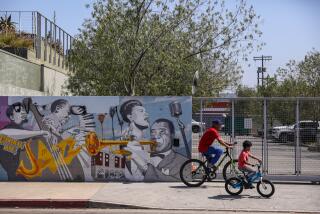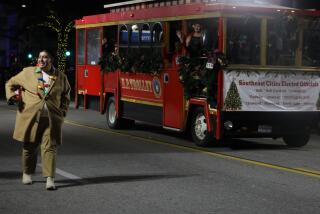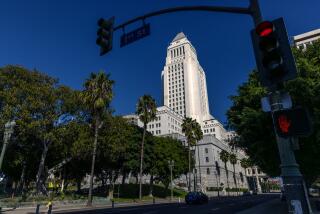Serving South L.A.
Today’s question: Have residents of South L.A. and surrounding communities been well-served by their political leaders? Would Bernard Parks or Mark Ridley-Thomas better serve the area as an L.A. County supervisor? All week, Joe R. Hicks and Earl Ofari Hutchinson debate the problems and potential of South Los Angeles.
Quit the race-based politics
Point: Joe R. Hicks
I think it would be difficult to argue that South L.A. has been well-served by either its elected leadership or those who have claimed the mantle of community leadership.
The titanic and increasingly nasty struggle between City Councilman Bernard Parks and state Sen. Mark Ridley-Thomas for the 2nd District seat on the Los Angeles County Board of Supervisors in many ways should be about recasting black political leadership. Instead, it has shaped up as a contest that is confined by the same old politics of racial representation.
There was a time in the history of the city when L.A.’s marginalized black community needed leadership that spoke for and acted in its interest. I grew up in South L.A., attended public schools there and knew that my life then was circumscribed by narrowly drawn lines of race. The Los Angeles Police Department was feared for its practices in my neighborhood. Today, the city’s black population is in numerical decline, the LAPD is a diversified and reformed force, demographic change has redefined the city’s neighborhoods, and racial discrimination can hardly be described as a major issue for the city’s black residents.
Change began, in part, with the election in 1973 of Tom Bradley as mayor, and also in rhythm with the civil rights revolution that swept the country in the 1960s, which transformed the racial landscape in our nation. Although race has become an increasingly less problematic aspect of life for L.A.’s black residents and educational and employment opportunities have opened up, black leaders continue to function as if their job is to represent and speak for blacks as opposed to performing the actual job of legislating and representing the districts they were elected to lead -- regardless of the skin color of their constituents.
A classic example of this conundrum was the approach taken by much of the city’s black leadership, elected as well as the omnipresent “community activists,” who failed to serve the actual interests of the black, brown and poor South L.A. residents by arguing that Martin Luther King Jr.-Harbor Hospital should remain open -- despite fatal flaws that facilitated the deaths of patients.
In large measure, the problem is that black leadership, elected or otherwise, functions as an adjunct of liberal, Democratic Party politics that continue to be wedded to high taxation, an expansion of government spending and the belief that government programs have a solution for all the problems of urban communities. They do not.
This approach was recently spotlighted by City Councilwoman Jan Perry’s fast-food ban. The City Council approved this nanny-state moratorium, which for one year bans new fast-food restaurants in a 32-square-mile swath of South L.A.. This is supposedly due to disproportionate levels of obesity and diabetes there, yet the ban will only harm business and employment prospects while delivering a message that South L.A.’s residents can’t make their own decisions about what to eat. All of the City Council members representing districts in and around South L.A. voted for this intrusive, insulting ban.
Truth be told, haven’t new conditions made race-specific leadership largely irrelevant? In the 21st century, don’t black Americans need a new narrative that isn’t based on racial victimization and the alleged continuation of racial oppression? I argue that this is indeed the case, and it will require a new type of leadership -- one that is not based on skin color.
Joe R. Hicks is vice president of Community Advocates Inc. and a KFI-AM (640) talk-show host. He is a former executive director of the Los Angeles City Human Relations Commission and the Southern Christian Leadership Conference.
Black leaders aren’t the problem
Counterpoint: Earl Ofari Hutchinson
Joe, you’re as predictable as the sun rising in the Sahara in July. I can always count on you to make the cheapest of cheap arguments when it comes to the alleged failing of black elected officials and activists to solve the chronic problems that plague South L.A. Your hit against them is always the same: They are Democrats, they have a trained constituency, they are generally outspoken on issues of poverty and police abuse and they believe that government can and should play a major role in providing services to South L.A.’s poor.
Joe, the hard reality is that the towering problems of gang violence, miserably failing public schools, Great Depression-level unemployment among young black males, the lack of affordable housing and the virtually nonexistent medical facilities of South L.A. have nothing to do with lousy, self-serving and ego-driven black leaders. They exist because of the decades of neglect by government agencies and private industry. Sixteen years after the 1992 riots, South L.A. does not have a single full-service public hospital. It has only a handful of quality markets and retail stores, a smattering of banks and a few new low- to moderate-income housing projects.
The fact that government agencies and the corporate sector reneged on their wildly inflated and politically expedient promises to remake South L.A. following the riots can’t be blamed on black elected officials and community activists. They have repeatedly bumped their heads against the hardened and racially insensitive bureaucratic wall in an effort to push government to spend more on new programs. They have tried to persuade major businesses to shed their racial paranoia about the area and set up shop in South L.A.
As for seasoned black pols Ridley-Thomas and Parks, I do agree that voters must put their feet to the fire at every turn. But that fire is to battle for more public and private resources to dent the poverty and neglect that plagues South L.A.
Joe, that’s far different than your reflexive smackdown of them for failing to wave a magic wand and make these problems instantly disappear. Parks and Ridley-Thomas know there will be plenty of eyes watching the one who finally ends up in outgoing Supervisor Yvonne B. Burke’s seat. I have not endorsed either candidate. They would both bring qualities to the Board of Supervisors that would help South L.A. They would fight for more business investment and spending on job programs, attack soaring school-dropout rates, improve police-minority relations and, yes, push for the reopening of King-Harbor Hospital as a full-service facility -- which, by the way, this “community activist” proudly fought not to keep open as an inferior, substandard killing machine, but as a quality hospital.
Ridley-Thomas and Parks won’t get a pass from my organization and other community leaders if they fail to fight as hard as they can for the interests of South L.A. In the end, they’ll be judged on how intense and relentless they wage that fight. But of course, Joe, that won’t be enough for you. They’re black leaders, making them failures in your eyes.
Earl Ofari Hutchinson is an author and political analyst. His new book is “The Ethnic Presidency: How Race Decides the Race to the White House.”
Day 1 | | | |
More to Read
A cure for the common opinion
Get thought-provoking perspectives with our weekly newsletter.
You may occasionally receive promotional content from the Los Angeles Times.






